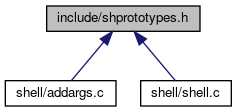
Go to the source code of this file.
Function Documentation
◆ xsh_argecho()
| shellcmd xsh_argecho | ( | int | nargs, |
| char * | args[] | ||
| ) |
引数を順に表示する。
「引数番号」と「引数番号に対応する引数(文字列として扱う)」が1行単位で出力される。
- Parameters
-
[in] nargs 引数の数 [in] args 引数(引数を持つ配列)
- Returns
- 0を返す。
Definition at line 15 of file xsh_argecho.c.
References printf().

◆ xsh_arp()
◆ xsh_bingid()
◆ xsh_cat()
◆ xsh_clear()
| shellcmd xsh_clear | ( | int | nargs, |
| char * | args[] | ||
| ) |
ディスプレイウィンドウをクリアする(xtermやVT100を想定している)
- Parameters
-
[in] nargs 引数の数 [in] args 引数(引数を持つ配列)
- Returns
- 成功時は0、コマンド名以外の引数が存在する場合は1を返す。
- Note
- printf()で使用されているエスケープシーケンスは、以下の意味を持つ。
・\033[0m :エスケープシーケンス指定をリセットして、未指定状態に戻す。 ・\033[2J\:画面クリアを行う。 ・\033[H :カーソルを画面の左上隅(最初の行、最初の列)に移動させる。
Definition at line 18 of file xsh_clear.c.
References fprintf(), printf(), and stderr.
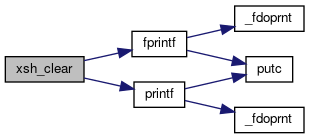
◆ xsh_date()
Definition at line 11 of file xsh_date.c.
References ascdate(), Date, DATE_DST_AUTO, DATE_DST_OFF, DATE_DST_ON, dateinfo::dt_bootvalid, dateinfo::dt_daylight, FALSE, fprintf(), gettime(), printf(), stderr, strncmp(), and SYSERR.

◆ xsh_devdump()
Definition at line 10 of file xsh_devdump.c.
References devtab, dentry::dvminor, dentry::dvname, fprintf(), NDEVS, printf(), and stderr.
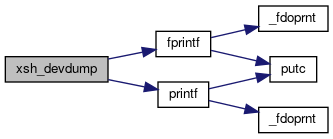
◆ xsh_echo()
| shellcmd xsh_echo | ( | int | nargs, |
| char * | args[] | ||
| ) |
STDOUT(標準出力)に引数に指定した文字列を出力する。
複数の引数がある場合は、改行せずにスペース区切りで引数が続けて出力される。
- Parameters
-
[in] nargs 引数の数 [in] args 引数(引数を持つ配列)
- Returns
- 0を返す。
Definition at line 15 of file xsh_echo.c.
References printf().

◆ xsh_ethstat()
◆ xsh_exit()
| shellcmd xsh_exit | ( | int | nargs, |
| char * | args[] | ||
| ) |
exitコマンドとして、シェル終了を引き起こす終了コードを返す。
- Parameters
-
[in] nargs 引数の数(使用しない) [in] args 引数(使用しない)
- Returns
- SHELL_EXITを返す。
Definition at line 17 of file xsh_exit.c.
References SHELL_EXIT.
◆ xsh_help()
Definition at line 11 of file xsh_help.c.
References cmdent::cfunc, cmdtab, cmdent::cname, fprintf(), ncmd, NULLCH, printf(), stderr, strncmp(), and strnlen().
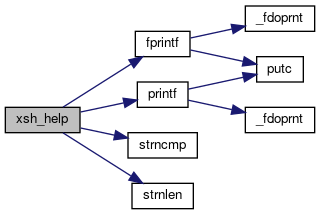
◆ xsh_kill()
◆ xsh_led()
◆ xsh_ls()
Definition at line 10 of file xsh_ls.c.
References fprintf(), ldentry::ld_name, LF_AREA_DIR, Lf_data, lfdata::lf_dir, lfdata::lf_dirpresent, lfdata::lf_dskdev, lfdata::lf_mutex, lfdir::lfd_files, lfdir::lfd_nfiles, lfscheck(), printf(), read(), signal(), stderr, strncmp(), SYSERR, TRUE, and wait().
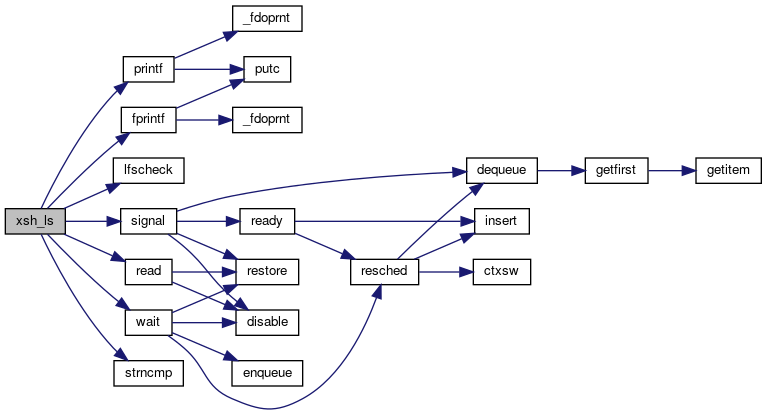
◆ xsh_memdump()
◆ xsh_memstat()
Definition at line 14 of file xsh_memstat.c.
References fprintf(), printf(), printFreeList(), printMemUse(), stderr, and strncmp().
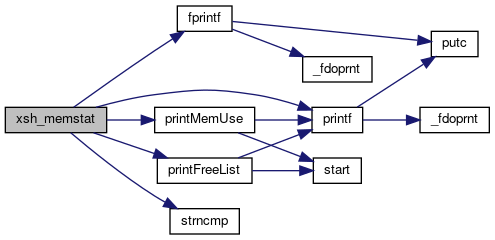
◆ xsh_netinfo()
Definition at line 12 of file xsh_netinfo.c.
References network::dnsserver, network::ethbcast, network::ethucast, FALSE, fprintf(), getlocalip(), network::ipbcast, network::ipmask, network::ipprefix, network::iprouter, network::ipucast, network::ipvalid, NetData, network::ntpserver, OK, printf(), sprintf(), stderr, strncmp(), and SYSERR.
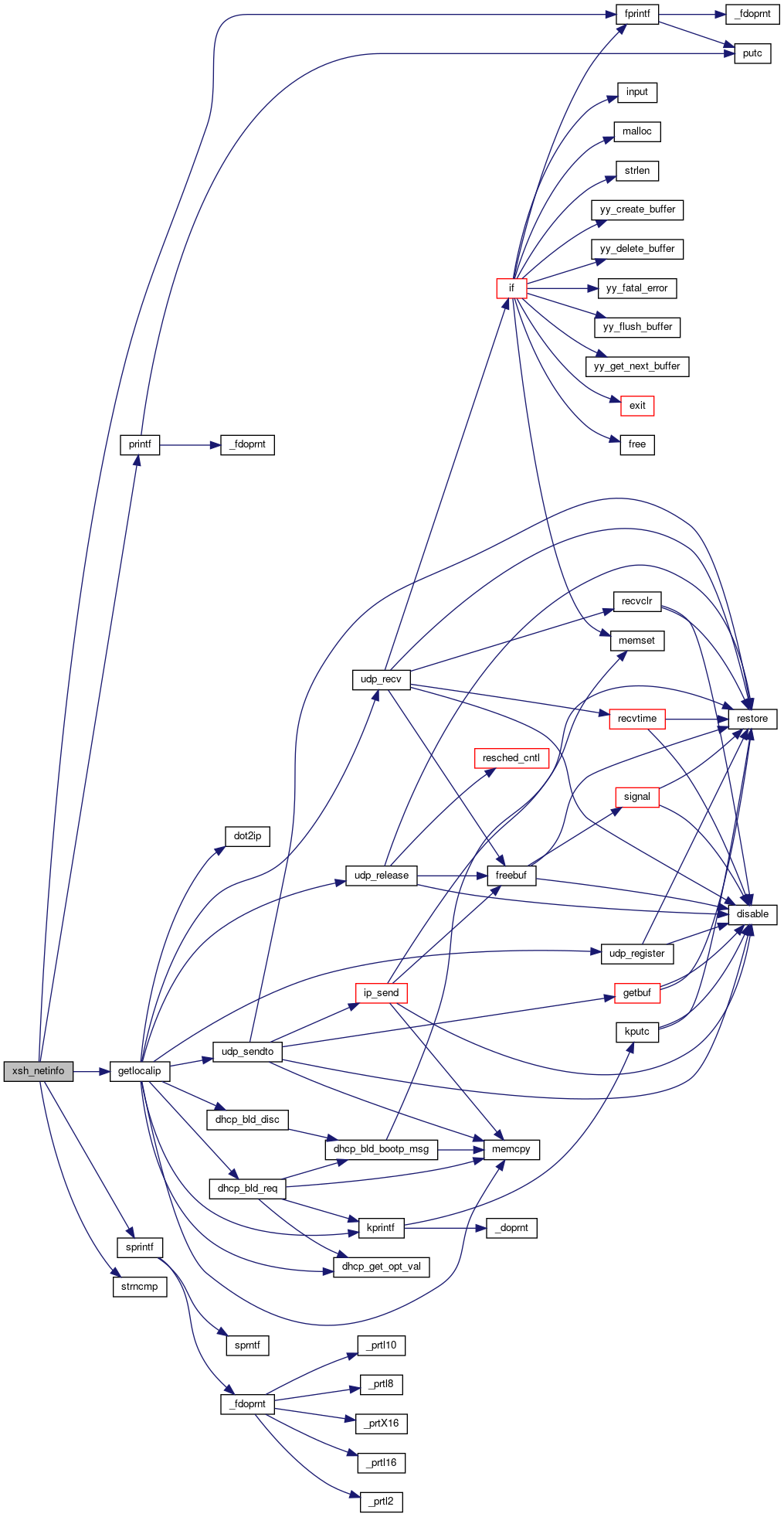
◆ xsh_nvram()
◆ xsh_ping()
Definition at line 11 of file xsh_ping.c.
References dnslookup(), dot2ip(), FALSE, fprintf(), ICMP_ECHOREQST, icmp_recv(), icmp_register(), icmp_release(), icmp_send(), printf(), stderr, strlen(), strncmp(), SYSERR, TIMEOUT, and TRUE.
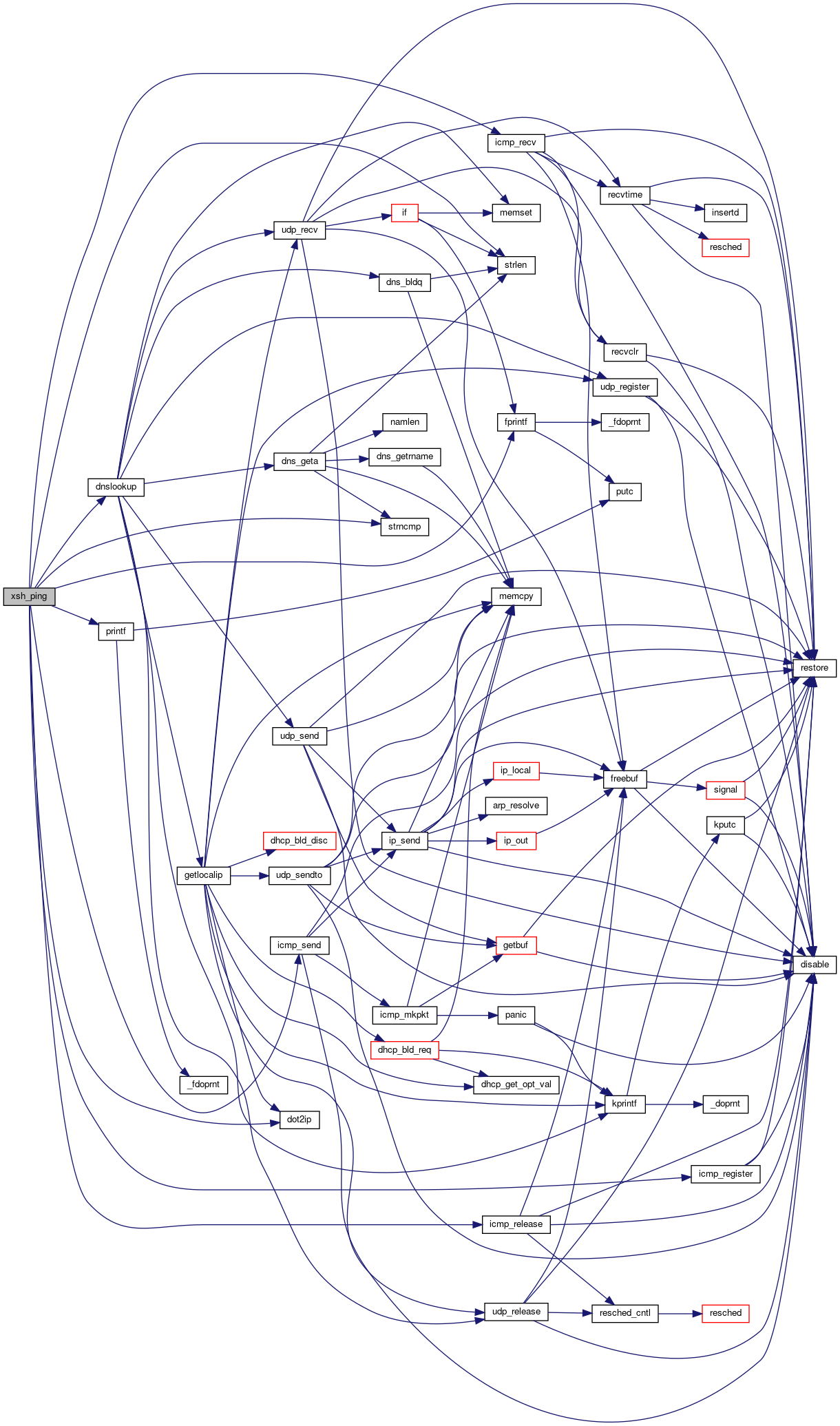
◆ xsh_ps()
Definition at line 11 of file xsh_ps.c.
References fprintf(), NPROC, PR_FREE, printf(), procent::prname, proctab, procent::prparent, procent::prprio, procent::prstate, procent::prstkbase, procent::prstklen, procent::prstkptr, stderr, and strncmp().
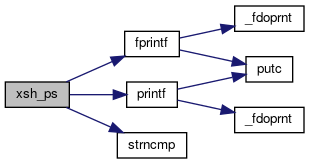
◆ xsh_sleep()
◆ xsh_udpdump()
Definition at line 11 of file xsh_udpdump.c.
References fprintf(), printf(), stderr, strncmp(), udpentry::udcount, udpentry::udlocport, UDP_FREE, UDP_SLOTS, udpentry::udpid, udptab, udpentry::udremip, udpentry::udremport, and udpentry::udstate.
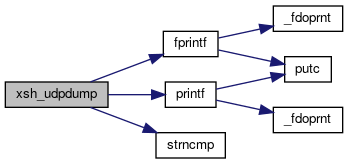
◆ xsh_udpecho()
Definition at line 14 of file xsh_udpecho.c.
References atoi(), delay(), dot2ip(), fprintf(), printf(), stderr, strncmp(), strnlen(), SYSERR, TIMEOUT, udp_recv(), udp_register(), udp_release(), and udp_send().
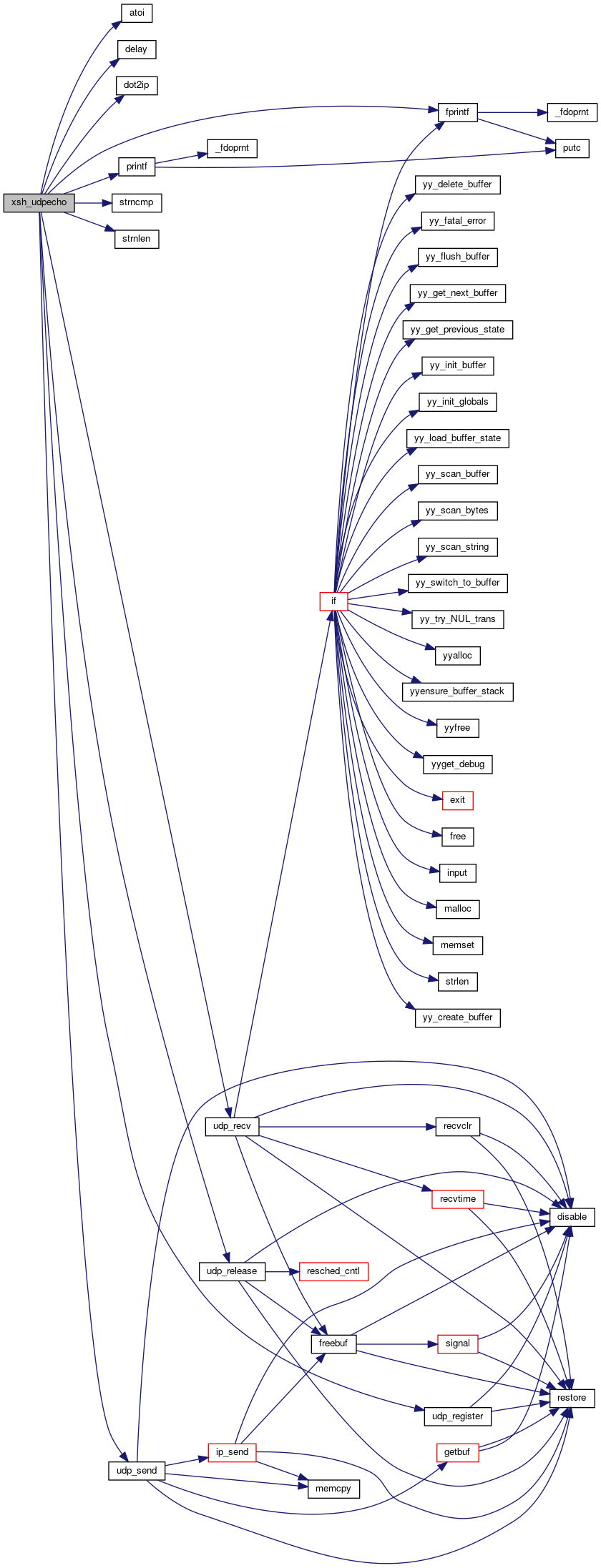
◆ xsh_udpeserver()
Definition at line 12 of file xsh_udpserver.c.
References fprintf(), getlocalip(), printf(), stderr, strncmp(), SYSERR, TIMEOUT, TRUE, udp_recvaddr(), udp_register(), and udp_sendto().
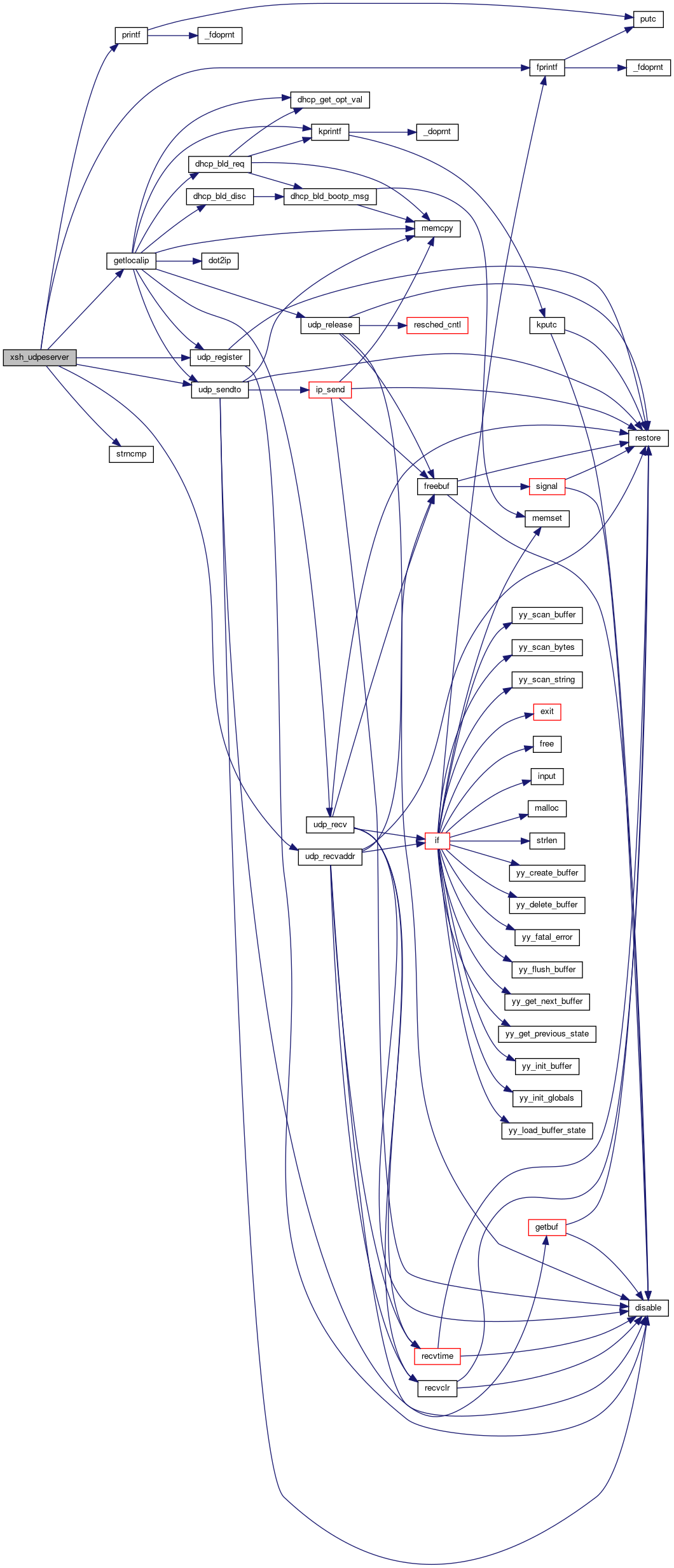
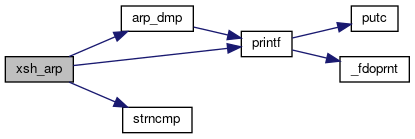
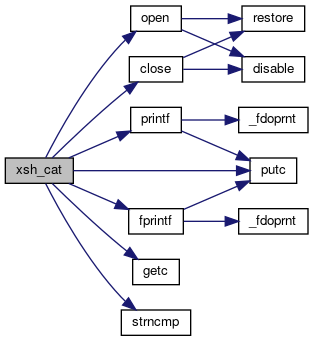
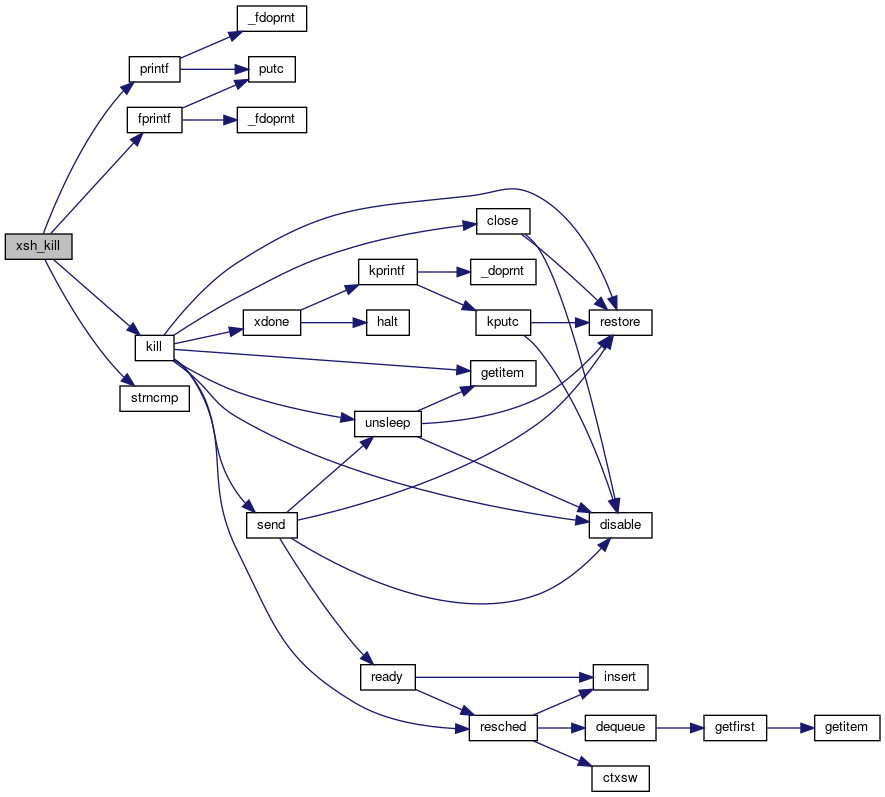
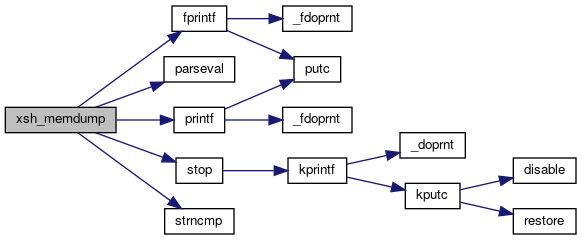

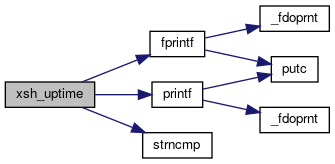
 1.8.13
1.8.13